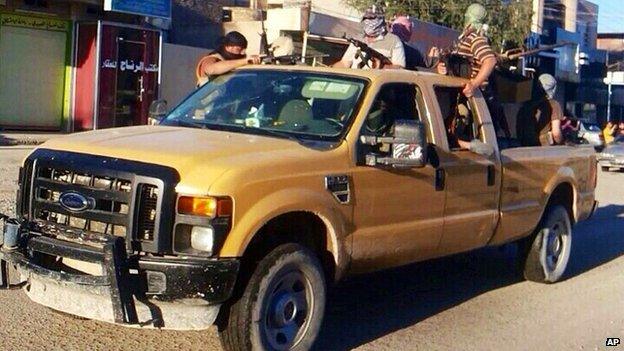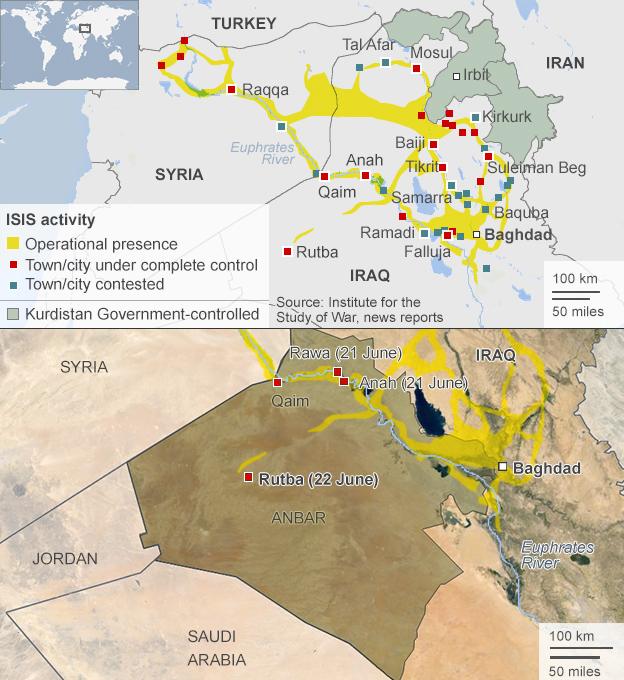Iraq crisis: Rutba latest western town to fall to Isis
- Published

Sunni fighters, among them the jihadists of Isis, have taken large swathes of western and northern Iraq
Sunni militants have seized another town in Iraq's western Anbar province - the fourth in two days.
Fighters of the Islamic State in Iraq and the Levant (Isis) captured Rutba, 90 miles (150km) east of Jordan's border, officials said.
They earlier seized a border crossing to Syria and two towns in western Iraq as they advance towards Baghdad.
The insurgents intend to capture the whole of the predominantly Sunni Anbar province, a spokesman told the BBC.
Iraq's government said on Sunday it had killed 40 militants in an air strike on the militant-held northern town of Tikrit, although witnesses said civilians died when a petrol station was hit.
US Secretary of State John Kerry, speaking in Cairo, said Isis' "ideology of violence and repression is a threat not only to Iraq but to the entire region".
Calling it a "critical moment", he urged Iraq's leaders "to rise above sectarian motivations and form a government that is united in its determination to meet the needs and speak to the demands of all of their people".
Earlier, Iran's supreme leader Ayatollah Ali Khamenei condemned the prospect of US intervention in Iraq, saying Washington's main intention was to keep Iraq within its own sphere of power.
Dismissing talk of sectarianism, he said: "The main dispute in Iraq is between those who want Iraq to join the US camp and those who seek an independent Iraq."

Analysis from BBC Persian's Bozorgmehr Sharafedin
The Obama administration is signalling that it wants a new government in Iraq without Prime Minister Nouri Maliki before launching any attack on Isis, but Iran's Supreme Leader has rejected both ideas.
Ayatollah Khamenei strongly opposed "the intervention of the US and others in the domestic affairs of Iraq", and said the US is not pleased with the results of the new election and "is seeking an Iraq under its hegemony and ruled by its stooges".
Khamenei's anti-US remarks weaken the possibility of co-operation. Iran feels it has the upper hand in Iraq and would try to resolve the crisis by the help of "Iraqi people, government and Shia clerics".

Rutba is strategically placed on the main road between Baghdad and Jordan.
It is the fourth town in what is Iraq's largest province to fall in two days to the Sunni rebel alliance, which Isis spearheads.
On Saturday the militants said they had taken the towns of Rawa and Anah, along the Euphrates river.
And Iraqi officials admitted Isis fighters had also seized a border crossing near the town of Qaim, killing 30 troops after a day-long battle.
According to the rebels, army garrisons, including at the area's command centre, abandoned their bases and weapons, and fled.
An Iraqi military spokesman described the withdrawal from Rawa, Anah and Qaim as a "tactical move... for the purpose of redeployment".

Isis in Iraq
In 60 seconds: What does Islamic State want?
Isis grew out of an al-Qaeda-linked organisation in Iraq
Estimated 10,000 fighters in Iraq and Syria
Joined in its offensives by other Sunni militant groups, including Saddam-era officers and soldiers, and disaffected Sunni tribal fighters
Exploits standoff between Iraqi government and the minority Sunni Arab community, which complains that Shia Prime Minister Nouri Maliki is monopolising power
Isis led by Abu Bakr al-Baghdadi, an obscure figure regarded as a battlefield commander and tactician

The capture of the frontier crossing could help Isis transport weapons and other equipment to different battlefields, analysts say.
The rebels are confident that towns they do not already control along the Euphrates valley will fall without much of a fight, with the help of sympathetic local tribes, says the BBC's Jim Muir in Irbil.
Since January, they have held parts of the provincial capital Ramadi, and all of nearby Falluja, half an hour's drive from Baghdad.
A spokesman for the Military Councils, one of the main Sunni groups fighting alongside Isis, told the BBC the rebels' strategic goal was the capital itself.
In the meantime they are clearly trying to take the string of towns along the Euphrates between Falluja and the western border, says our correspondent.
Baghdad fears
There is deep pessimism in Baghdad about the government's war against Isis, which appears better trained, equipped and more experienced than the army, diplomats and politicians have told the BBC.
The Sunni extremists attacked the city of Mosul in early June and have since seized swathes of territory across Iraq.
The Iraqi government has urged the US, Europe and the UN to take immediate action to help deal with the crisis - including targeted air strikes.
But Isis has established secure safe havens, including some in neighbouring Syria, which will be difficult to target, experts say.
And experts warn that using air strikes now would endanger civilians.
Shia cleric Moqtada al-Sadr has rallied followers to join a military parade across Iraq, as Jonathan Beale reports from Baghdad
The US, which pulled out of Iraq in 2011, is sending some 300 military advisers to Iraq to help in the fight against the insurgents there.
But the White House insists there is no purely military solution to the crisis.
Mr Obama believes Mr Maliki has endangered the country by ignoring Sunni concerns and governing in the interests of the Shia majority, correspondents say.



Are you in Iraq or do you have family there? Have you been affected by recent events? You can send details of your experiences to haveyoursay@bbc.co.uk, external using 'Iraq' in the subject line.